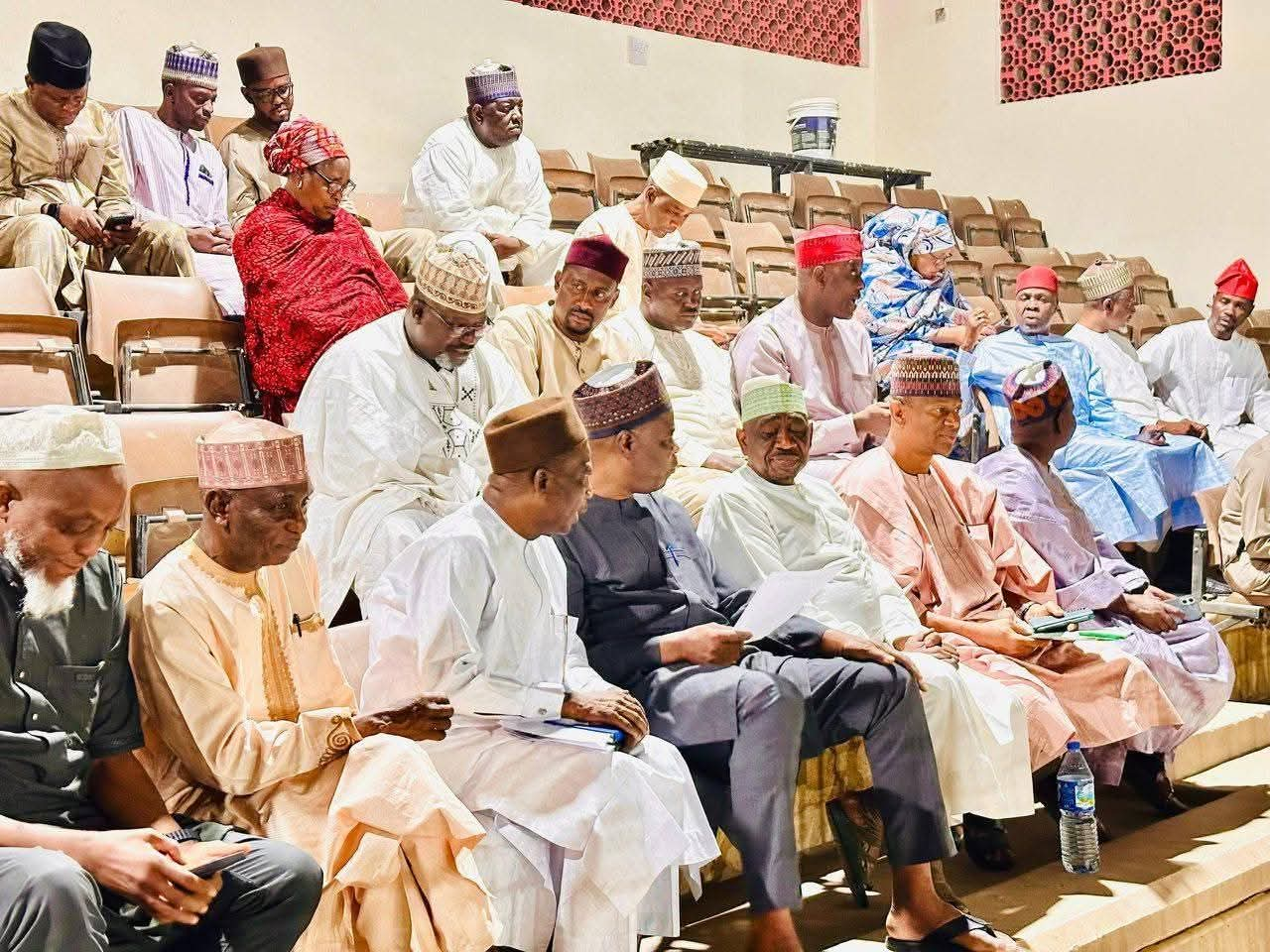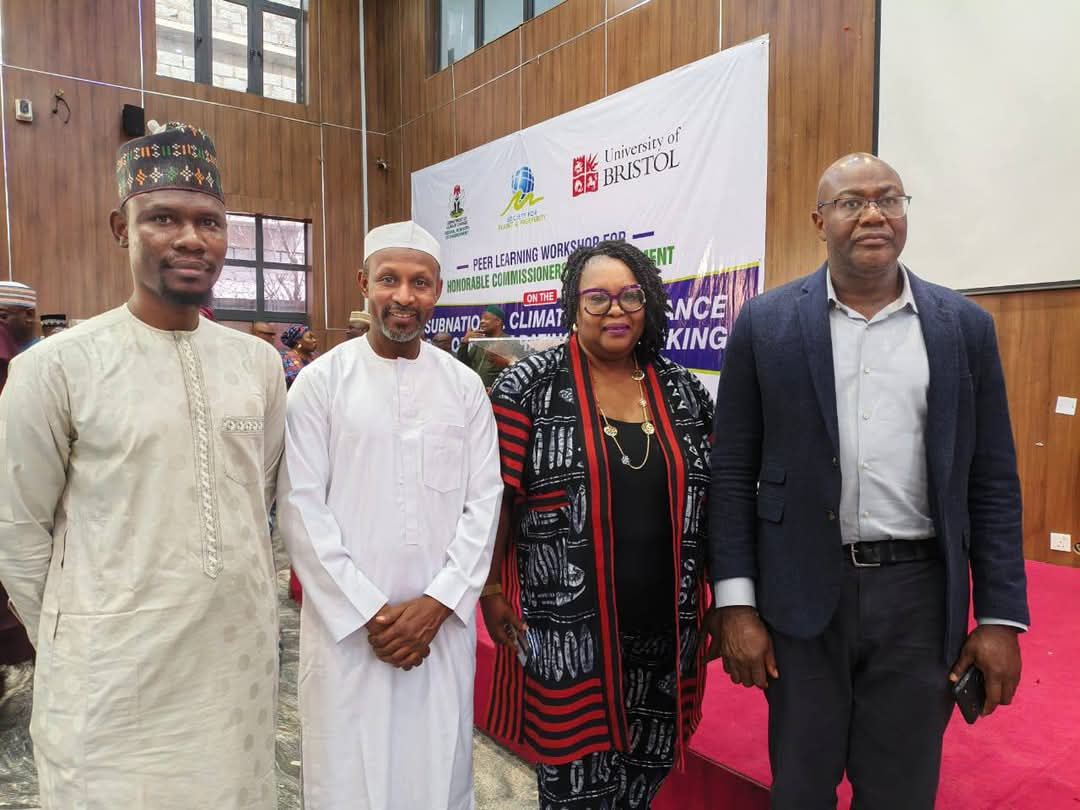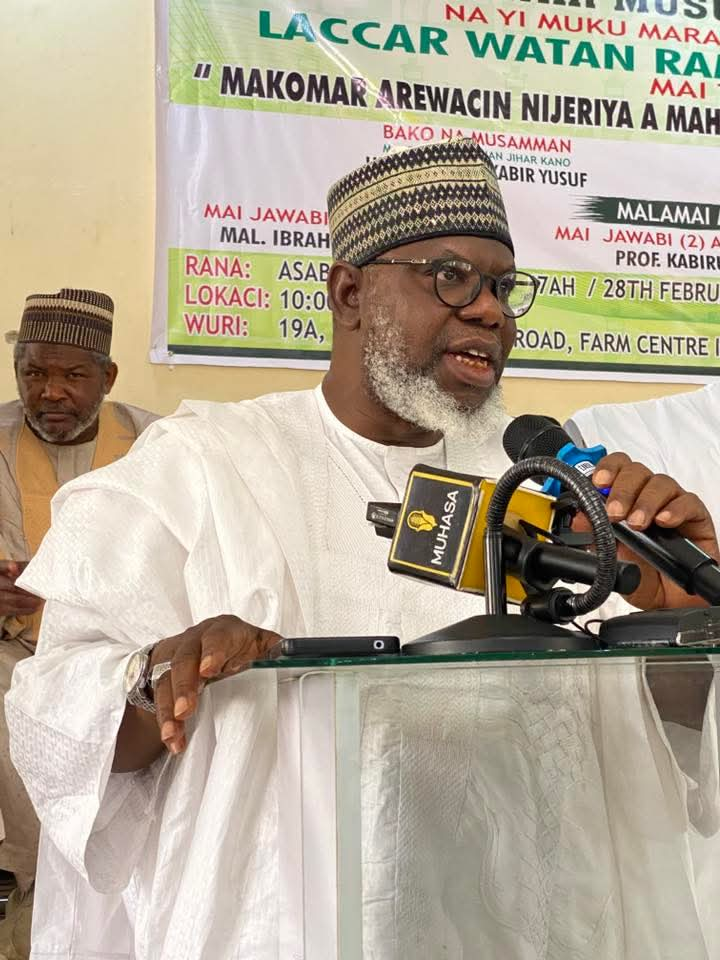News
Automation, Next Stage of Service Delivery in Public Sector – Danbatta

Nasiru Yusuf
The Executive Vice Chairman of the Nigerian Communications Commission (NCC), Umar Garba Danbatta has said leveraging the potential of Information and Communication Technology (ICT) to automate service delivery should be the next frontier of excellent service delivery to Nigerians by public institutions.
KANO FOCUS reports that Danbatta made the assertion in a goodwill message presented on his behalf by NCC’s Director, Public Affairs, Ikechukwu Adinde, at the opening ceremony of a three-day SERVICOM retreat, which started on December 1, 2021 at the Communications and Digital Economy Complex, Mbora, Abuja.

The retreat focused on, ‘Charter Performance Monitoring and Reporting’, was aimed at monitoring the implementation of the NCC’s Client Service Charter, identifying gaps, measuring and evaluating the progress of service delivery in the Commission.
SERVICOM, an acronym derived from SERVICE COMPACT WITH ALL NIGERIANS, speaks to a special social contract between the Federal Government through its institutions (Ministries, Department and Agencies) and the Nigerian people that ensures services are delivered in a courteous, prompt and efficient manner.
Speaking at the event, attended by staff of NCC, Adinde said the NCC has been living up to its expectation as one of the public institution that has continued to implement the Service Charter with all its various stakeholders.
The Director Public Affairs stated that the digital economy drive of the Federal Government should mean that more services be delivered online to the people of Nigeria and in a more efficient manner in line with the philosophy of SERVICOM.
He said the NCC is an important partner of SERVICOM in its journey towards service delivery and excellence, and invited the participants to recall that fact in the passion and commitment of Prof. Danbatta in ensuring that telecom service providers deliver optimal service to varied categories of stakeholders.
“Therefore, from our perspective as regulator of the digital ecosystem in Nigeria, we feel that automation of service should be the next stage of service delivery.
While we have started this journey with the example of REMITA, which has brought about a lot of efficiency and transparency into the payment remittances by public and Ministries, Department and Agencies (MDAs) of government,” Adinde stated.
On the implementation of the NCC Charter for SERVICOM, Adinde said the NCC boasts of one of the best and brightest brains that could be found in the public sector as civil servants, who are ingrained with good work ethics and culture.
“Our staff are renowned for their warmth and geniality when dealing with internal and external stakeholders. They work as a team on the principle of achieving Specific Measurable, Achievable, Realistic, and Time-bound (SMART) objectives of the Commission,” he said.
Adinde also listed the roles of the Commission in collaborating with other MDAs in various ways, in order to achieve policy objectives of government in many fronts.
He also highlighted a number of corporate social responsivity (CSR) projects of the Commission being implemented singly or jointly with other MDAs towards achieving the objective of government to serve the citizenry better.
As a further demonstration of the duty NCC owes telecoms consumers, whose interest must be protected in line with Nigerian Communications Act (NCA), 2003, Adinde said NCC created the Consumer Affairs Bureau in September 2001, to ensure consumer protection through policy development and monitoring, advocacy, as well as information and education of all shades of stakeholders.
“Consequently, NCC is one of the few MDAs that has a dedicated toll-free number, designed specifically for the escalation of issues between telecommunications service providers and consumers.
We also constantly monitor the Quality of Service (QoS), ensuring that service delivery issues are within the acceptable key performance indicators (KPIs),” Adinde said.
Meanwhile, the National Coordinator/Chief Executive Officer of SERVICOM, Nnena Akajemili, in her remark at the event, commended NCC for contributing to the cultivation of effective communication between the Commission and its various stakeholders for improved service delivery.
Akajemili acknowledged the commitment of NCC towards facilitating major activities, even as she affirmed that the Commission had improved significantly in delivering its key regulatory functions.
Akajemili also observed that NCC went the extra mile in engaging its stakeholders as well as creating affinity between itself and its stakeholders.
Akajemili stated that she was particularly gratified by NCC’s contribution of 11.94 per cent to the nation’s Gross Domestic Product (GDP), based on the National Bureau of Statistics (NBS) report for the third quarter of 2021. However, the SERVICOM Chief Executive beseeched the Commission sustain and expand on its collaboration with other Ministries, Departments and Agencies (MDAs) specifically in the area of data management, CSR, Value Added Services (VAS) and short codes, to enhance greater synergy among MDAs.
Head, Legislative and Government Relations, NCC and SERVICOM Nodal Officer at the Commission, Bashir Bello, said SERVICOM, as a service delivery initiative, requires everyone to put in his or her best in achieving desired objectives.
He emphasized the role of Management’s support, education, and commitment towards improving and consolidating the various SERVICOM interventions that had been initiated.
The event was attended by SERVICOM Team leads, departmental liaisons officers in the NCC, SERVICOM rapporteurs, and other staff of the Commission.

Headlines
APC constitutes committees for Kano state congress

Nasiru Yusuf Ibrahim
The All Progressives Congress (APC) in Kano State has announced the constitution of three high-level committees to oversee its forthcoming State Congress scheduled for Tuesday, March 3, 2026.

KANO FOCUS reports that the congress is slated to take place at the Indoor Sports Stadium, Kofar Mata, Kano, at 8:00 p.m.
The disclosure was made in a statement issued on Monday by the Kano APC Spokesperson, Hon. Ahmad Aruwa, on the directive of the outgoing State Chairman, Hon. Prince Abdullahi Abbas Sunusi.
According to the statement, the committees were constituted to ensure a transparent, credible and well-coordinated congress in line with the party’s constitution and guidelines.
Congress and Accreditation Committee
The Congress and Accreditation Committee is chaired by Rabi’u Sulaiman Bichi, with Hon. Muhammad Jamu Yusuf serving as Secretary. Other members include Hon. Baffa Babba, Rt. Hon. Butu-Butu, Hajiya Sa’adatu Algon, Hon. Ali Haruna Makoda, Hon. Abdullahi Rogo, Hon. Baffa Takai, Hon. Lamin Sani, Sani Ma’aruf, Hon. Sani Bala, Khalid Ishaq, Barrister Mannir Rimin Gado and Hon. Hassan Hussain.
Publicity Committee
The Publicity Committee is headed by Muhammad Garba as Chairman, with Sunusi Bature Dawakin Tofa as Secretary. Members include Lawan Hussaini, Jamilu Danbatta, Yusuf Sharada, Musa Liliyasu, Ghali Sadiq, Binta Spikin, Uba Dan Zainab, Ibrahim Yaro and Ahmad Aruwa.
Security Committee
The Security Committee is chaired by Col. Malami. Other members are Mustapha Bakwana, the Director-General of Special Services, Bala Albasu, CP Balarabe Musa, Group Captain Kura, Dr. Garba Sani Diso and Air Commodore Yusha’u Sulaisu Tudun Wada.
Hon. Aruwa stated that the party leadership has full confidence in the committees’ ability to deliver a peaceful, orderly and successful congress.
He urged party members and stakeholders to cooperate fully with the committees and conduct themselves in a disciplined and responsible manner throughout the exercise.
The APC reaffirmed its commitment to strengthening internal democracy and consolidating unity within the party in Kano State.

Headlines
Kano emerges as MRV pilot state, advances climate governance

Nasiru Yusuf Ibrahim
Kano State has strengthened its position as a leading subnational actor in climate governance following a strategic departmental meeting of the Kano State Ministry of Environment and Climate Change.

KANO FOCUS reports that a major highlight of the meeting was the state’s intensified support for Nigeria’s Second Biennial Transparency Report (BTR2) under the United Nations Framework Convention on Climate Change (UNFCCC). The ministry disclosed that ongoing collaboration with sectoral ministries, departments and agencies (MDAs) across Energy, Agriculture, Forestry and Other Land Use (AFOLU), Waste and Industrial Processes is ensuring credible and harmonised greenhouse gas emissions data in line with the transparency requirements of the Paris Agreement.
In what officials described as a significant milestone, Kano has been selected as one of three pilot states under the UK PACT programme to develop a Measurement, Reporting and Verification (MRV) system. The initiative is expected to institutionalise structured emissions reporting, strengthen accountability mechanisms and support tracking of Nigeria’s Nationally Determined Contributions (NDCs).
In a statement signed by Dr. Umar Saleh Anka, Director of Climate Change, the ministry also announced the commencement of preparations for the third edition of the Climate Governance Performance Ranking. The exercise aims to enhance methodological rigour, promote peer learning, improve transparency and deepen stakeholder engagement in climate action.
Further consolidating the state’s leadership role, the Commissioner for Environment was recently appointed Regional Lead (North West) of the Community of Practice for Environment and Climate Change, a move expected to strengthen regional collaboration and policy coordination.
The statement added that, the state government reaffirmed its commitment to strengthening institutional systems, improving emissions transparency and advancing coordinated climate action across Nigeria.

Headlines
Only 30% of school-age children attend school in Northern Nigeria – Prof. Shehu

Nasiru Yusuf Ibrahim
The Executive Secretary of the National Educational Research and Development Council, Prof. Salisu Shehu, has disclosed that only 30 per cent of school-age children in Northern Nigeria are currently attending school.

KANO FOCUS reports that Prof. Shehu made the revelation on Saturday while delivering a lecture at the 10th Ramadan Lecture organised by the Islamic Forum of Nigeria in Kano.
He said Nigeria presently has over 20 million out-of-school children, a figure he noted is rising due to armed banditry in the North-West and insurgency in the North-East. According to him, the closure of many schools in some states as a result of insecurity has further worsened the situation.
The educationist also expressed concern over the shortage of teachers in schools, despite increasing retirements, deaths, transfers and career changes among teaching staff. He lamented that examination malpractice, combined with weak oversight, has led to what he described as a collapse of the education system in Northern Nigeria.
“Products of examination malpractice are now becoming teachers and lecturers, thereby perpetuating the cycle,” he said.
Prof. Shehu warned that lack of access to education is contributing to thuggery and banditry in the region, stressing that education produces responsible citizens, while ignorance breeds irresponsibility.
He urged Northern governors to declare a state of emergency in the education sector and prioritise funding and reforms. He also advised citizens to establish education endowment funds, citing examples from Bangladesh and Malaysia where Muslim communities have addressed similar challenges through charitable initiatives.
The professor criticised what he described as misplaced priorities, questioning why some governors sponsor pilgrimages while many citizens lack access to basic education and quality healthcare.
Presenting a paper on the fate of Northern Nigeria in terms of security, Alhaji Ibrahim Ado Kurawa linked climate change and global warming to the worsening security challenges in the North-East. He identified the longstanding farmer-herder conflict as a root cause of banditry in the North-West.
Kurawa noted that insecurity has contributed to making the North-East and North-West the poorest regions in the country. He expressed dismay that Northern Nigeria has failed to effectively address the issues of almajiranci and out-of-school children since the First Republic.
He called for sincerity in governance, political reforms and greater collaboration among Northern groups such as the Arewa Consultative Forum (ACF) and the Northern Elders Forum (NEF), alongside the Islamic Forum of Nigeria.
On the economic outlook of the region, Prof. Kabiru Isa Dandago decried rising poverty, unemployment, overdependence and the high cost of living as major challenges confronting Northern Nigeria. He advocated for a strategic development plan and urged voters to elect credible leaders as a pathway to change.
In his address, the Chairman of the Islamic Forum of Nigeria, Gen. Ahmad Muhammad Daku, said the 2026 edition marked the 10th anniversary of the annual Ramadan lecture series. Represented by Alhaji M.T. Bello, he noted that the topics were carefully selected to address contemporary issues affecting Northern Nigeria.
The Acting Executive Secretary of the Forum, Alhaji Dalhatu Gwarzo, appreciated the lead presenters, particularly Prof. Shehu, for their contributions. He announced that a team of rapporteurs had been constituted to compile the papers and comments for a post-Ramadan roundtable discussion with stakeholders.
Gwarzo also revealed plans to publish a compendium of the ten Ramadan lectures delivered over the past decade for the benefit of the Muslim community. He urged Muslims to pray for Northern Nigeria, the country and the world amid prevailing challenges.
He further appealed to political leaders to ensure proper implementation of the new Computer-Based Test (CBT) policy for candidates sitting for the West African Examinations Council (WAEC) senior secondary school examinations.
Former Secretary to the Kano State Government, Alhaji Sule Yahaya Hamma, said 80 per cent of Northern Nigeria’s problems could be addressed by governors, urging them to take decisive action in their respective states.
Chairman of the Council of Ulama, Malam Ibrahim Khalil, emphasised patriotic leadership as a solution to current challenges, citing the example of Khalifa Umar bin Abdulaziz as a model of responsible governance.
Other dignitaries at the event included the Emir of Rano, Amb. Muhammad Isa Umaru, and the Madakin Zazzau, Alhaji Munir Jafaru.












